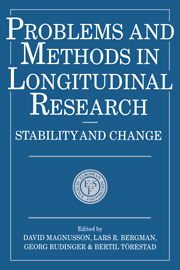Book contents
- Frontmatter
- Contents
- Contributors to this volume
- Foreword
- Preface
- 1 Studying individual development: problems and methods
- 2 Modeling individual and average human growth data from childhood to adulthood
- 3 Intraindividual variability in older adults' depression scores: some implications for developmental theory and longitudinal research
- 4 Now you see it, now you don't – some considerations on multiple regression
- 5 Differential development of health in a life-span perspective
- 6 Assessing change in a cohort-longitudinal study with hierarchical data
- 7 Statistical and conceptual models of ‘turning points’ in developmental processes
- 8 Qualitative analyses of individual differences in intra- individual change: examples from cognitive development
- 9 Application of correspondence analysis to a longitudinal study of cognitive development
- 10 Event-history models in social mobility research
- 11 Behavioral genetic concepts in longitudinal analyses
- 12 Genetic and environmental factors in a developmental perspective
- 13 Structural equation models for studying intellectual development
- 14 Longitudinal studies for discrete data based on latent structure models
- 15 Stability and change in patterns of extrinsic adjustment problems
- Index
3 - Intraindividual variability in older adults' depression scores: some implications for developmental theory and longitudinal research
Published online by Cambridge University Press: 27 April 2010
- Frontmatter
- Contents
- Contributors to this volume
- Foreword
- Preface
- 1 Studying individual development: problems and methods
- 2 Modeling individual and average human growth data from childhood to adulthood
- 3 Intraindividual variability in older adults' depression scores: some implications for developmental theory and longitudinal research
- 4 Now you see it, now you don't – some considerations on multiple regression
- 5 Differential development of health in a life-span perspective
- 6 Assessing change in a cohort-longitudinal study with hierarchical data
- 7 Statistical and conceptual models of ‘turning points’ in developmental processes
- 8 Qualitative analyses of individual differences in intra- individual change: examples from cognitive development
- 9 Application of correspondence analysis to a longitudinal study of cognitive development
- 10 Event-history models in social mobility research
- 11 Behavioral genetic concepts in longitudinal analyses
- 12 Genetic and environmental factors in a developmental perspective
- 13 Structural equation models for studying intellectual development
- 14 Longitudinal studies for discrete data based on latent structure models
- 15 Stability and change in patterns of extrinsic adjustment problems
- Index
Summary
INTRODUCTION
Research focus
A salient aspect of research on adult development and aging is the use of general dimensions of interindividual differences to classify elderly persons into diagnostic groups, to predict longevity, morbidity, mortality, and other conditions, and to theorize about the nature of development and change. Among the more prominent variables that social and behavioral scientists are using currently for these purposes are measures of morale, life satisfaction, autonomy and control, adjustment, and depression. Of these, depression has become a major focus of concern because of both its probable association with the variety of losses that older adults are apt to experience (spouse, job, status, health, etc.) and its mediating role between the onset of traumatic events and the person's subsequent adaptation. An aspect of research conducted with depression and other relatively broad interindividual differences dimensions that has yet to be integrated into either theoretical or methodological concerns generally are the various phenomena of intraindividual variability or short-term changes.
Although greater and greater levels of sophistication in measurement, research design, and data analyses are being reached in longitudinal approaches (see, e.g., Goldstein, 1979; Nesselroade & Bakes, 1979; Schaie, Campbell, Meredith & Rawlings, 1988), many promising ideas and innovations do not readily filter into substantive research efforts. An encouraging conception and accompanying set of findings that researchers in adult development and aging have not yet sufficiently taken into account concern the nature, scope, and correlates of intraindividual variability and the implications that arise therefrom both for explanatory purposes and for the classification and prediction objectives mentioned above (Nesselroade, 1990).
Information
- Type
- Chapter
- Information
- Problems and Methods in Longitudinal ResearchStability and Change, pp. 47 - 66Publisher: Cambridge University PressPrint publication year: 1991
Accessibility standard: Unknown
Why this information is here
This section outlines the accessibility features of this content - including support for screen readers, full keyboard navigation and high-contrast display options. This may not be relevant for you.Accessibility Information
- 10
- Cited by
